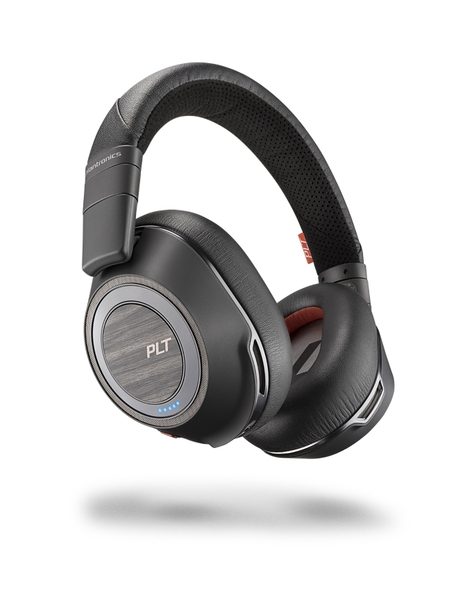
My employer upgraded the various phone systems our many offices were using to an enterprise phone system at the beginning of November. It was the first step to creating a unified communication environment for the entire enterprise. The second step of the upgrade will be a phone app and windows app to allow all communication through either a smartphone or the computer (laptop). I volunteered to pilot this system in my office and I’m lucky enough to test the Plantronics Voyager 8200 UC headset on everything from noise-canceling during air-travel and office use, listening to music, conferencing, and voice communication – all through Bluetooth. Read on to see what I think!
Unboxing
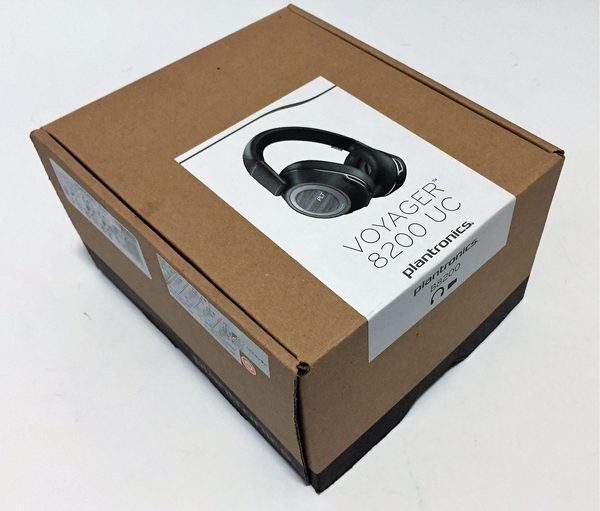
The headphones don’t come in an elaborate package. Some of Plantronics other products come in packaging that has more retail focus but these just came in a brown cardboard box. After using these for a couple of weeks I have come to realize that the lack of a flashy exterior package does not detract from the enjoyment of what is inside.
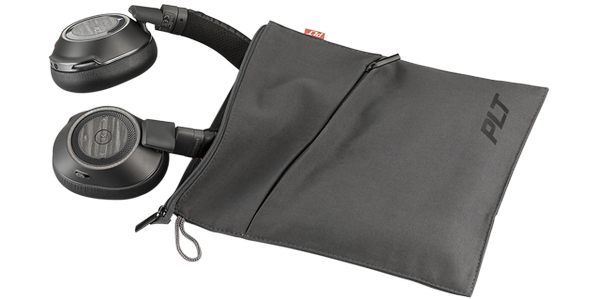
The box comes with the following:
- Headset
- Carrying case
- Quick start guide
- BT600
- USB Charging cable
- 3.5mm audio cable
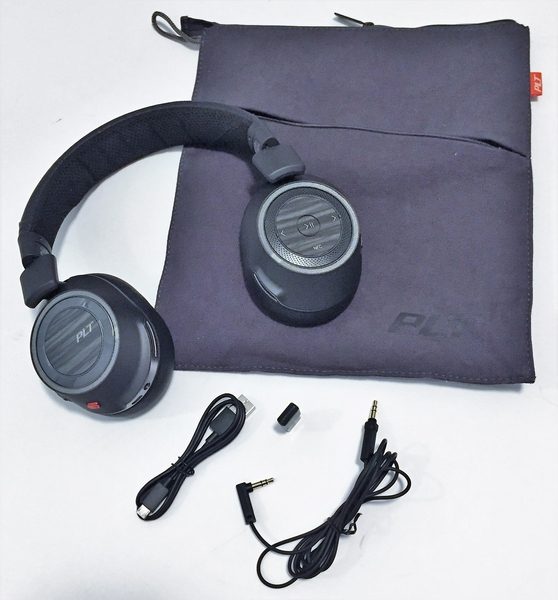
The carrying case is a fabric bag lined with soft fleece. It has an accessory pocket on the front that has a zipper closure about 1/3 of the way from the top, but actually encompasses the entire front of the bag – the compartment extends above the zipper. The main compartment also closes with a zipper. On the side there is a loop. The front of the bag has a black, stylized “PLT” logo imprinted on the dark grey material, and the side of the bag has an orange tag with “PLT” written on one side and “Plantronics” on the other.
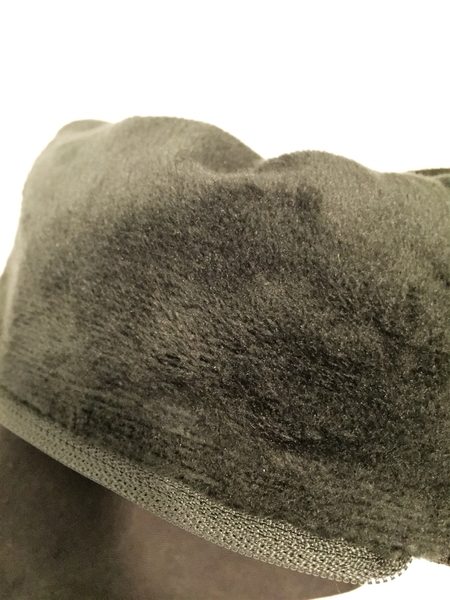
I was initially concerned that the case was not a hard-walled design similar to the cases provided with some of the noise canceling headphones sold by Bose and Sony. However, on a flight from San Diego to Boston the traveler next to me accidentally sat on the headphones. I was prepared to lift a broken headset with a dangling ear cup, but these headphones are precision made and durable. The headphones emerged from under my neighbor’s rear unscathed. So maybe a soft case is all that’s needed; it will keep them clean and will prevent the cups from getting snagged on one thing or another.
Design
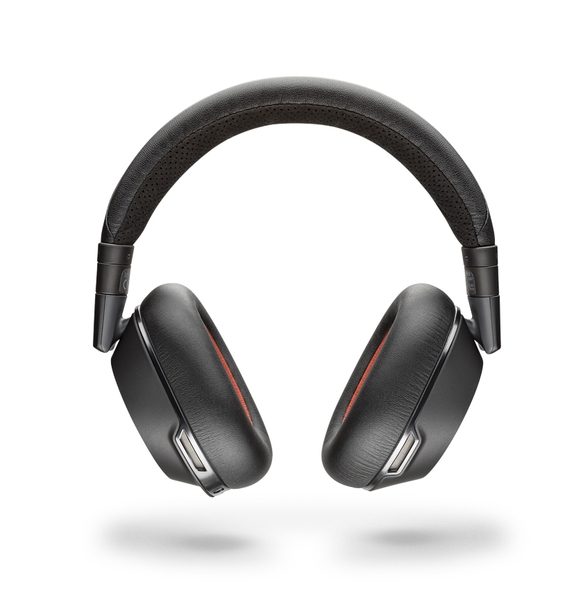
The design of the headphones emphasizes comfort, ergonomics, and usability but still remains fashionable. The headband is covered with leather on top and breathable suede on the head facing side. It is cushioned to rest against the scalp and has just the right amount of spring for my head. The headband expands with a metal leaf independently over each ear. A pattern etched on each metal leaf which represents the LEDs of a frequency spectrum display help ensure that the headband is centered on the head. The earcups can twist forward just a bit, but twist backwards to almost 90 degrees (which is how the entire set can fit in the carry sack). The twisting action doesn’t occur freely – it must be moved by hand. The earcups also pivot up and down, but this movement is a spring return to the neutral position. The earcups are angled slightly forward to follow the natural slope of the ear from the top to the bottom of the lobe. The cushions of the earcups are squishy polyurethane coated foam which provides good support and noise isolation.
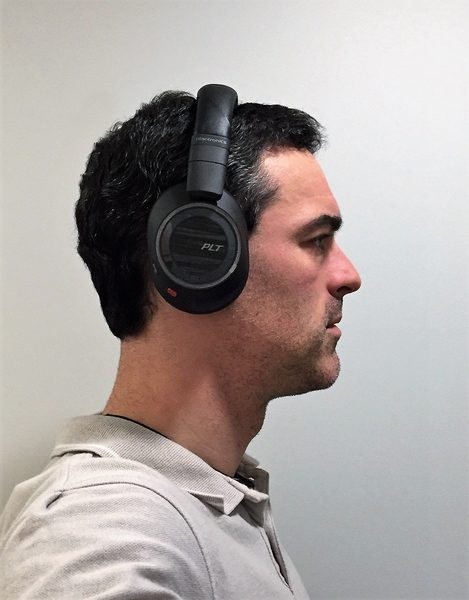
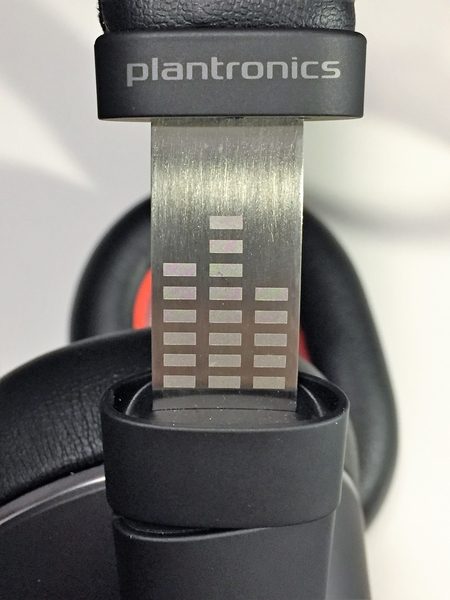
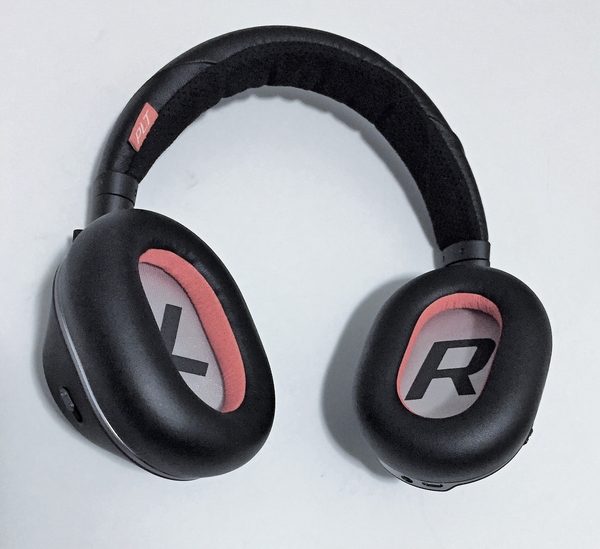
The mostly black and charcoal grey colors are punctuated by smartly placed orange around the inside of the earcups. The inside of the earcups are labeled “L” and “R” in the stylized Plantronics font against a white cloth covering the speaker grill (and the capacitive sensors which can detect if the headphones are being worn). the cushions meet a metal bezel into which the 3.5 mm audio cable and USB charging cable can be plugged into on the right side. (See the featured image at the top of the story.) The bezel also surrounds the microphones used to pick up the wearers voice when being used as a headset. Around the outside of the earcups is a metallic screen that covers the area where ambient microphones are positioned. the back of the earcups are covered by a faux wooden laminate. On the left-hand side, the laminate includes operation buttons. On the right-hand side is an indicator light for pairing, battery strength, mute and low power. The LEDs are mounted below a glossy plastic ring.
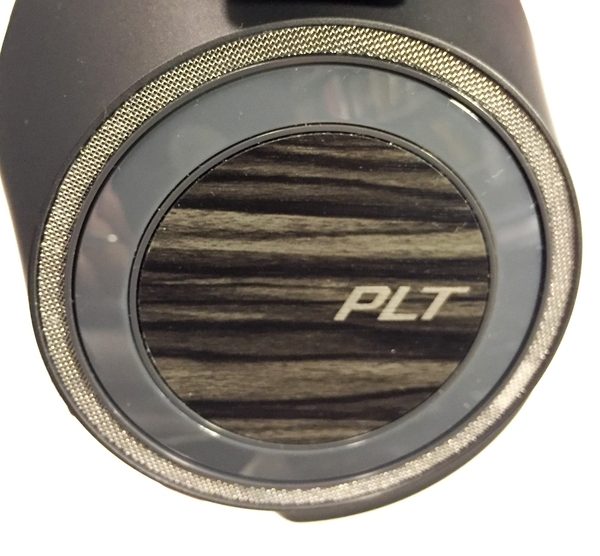
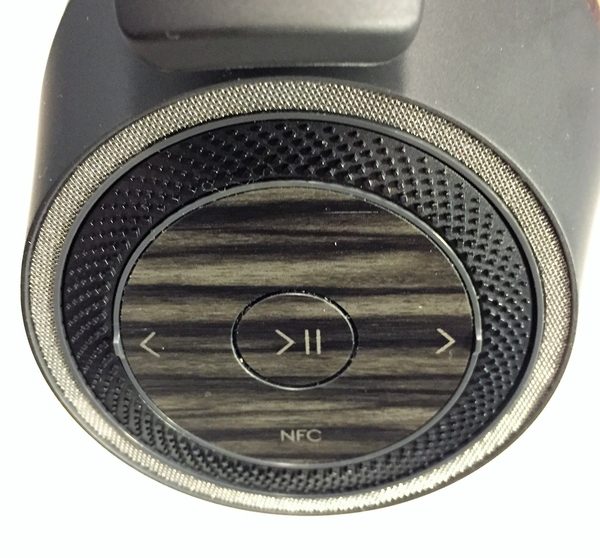
Note that this review is for the black/charcoal colors, but that the headphones are also available in a beige color scheme:
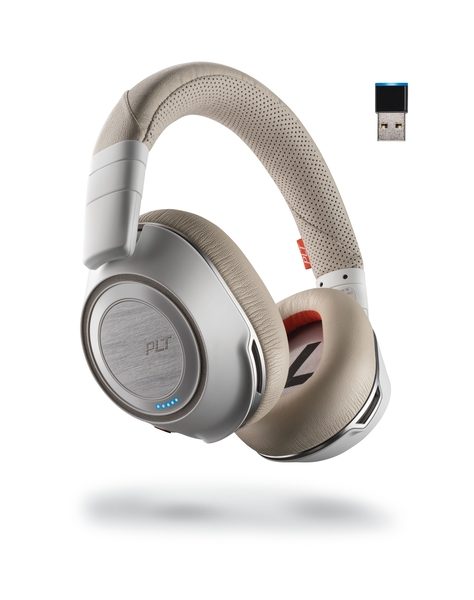
Operation
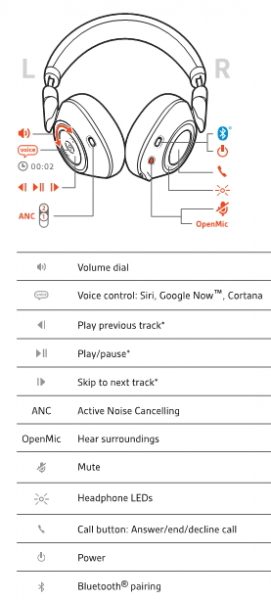
With so many capabilities, one might believe that the operation of the headset may be complicated, but the sensible layout of the controls makes using the headset intuitive. The volume dial on the left-hand side increases volume by rotating forward and decreases the volume by rotating back. The volume adjustment occurs in 10 steps and the dial has a spring return to center after the adjustment is made. The headset has an optional setting that will play tones that correspond to the volume level.
The dedicated voice control button seems to work fine for Google Now on a phone or Siri on an iPhone. I wasn’t able to test Siri on a mac or Google now on a chrome book. It does not work to activate Cortana on a Windows 10 machine, but it can be used to dictate commands if the Windows-C shortcut or microphone icon is used.
Skipping tracks is a breeze with the dedicated forward and reverse buttons – no double pressing and triple pressing the play/pause button is required. It would be great if this allowed rewind and fast forward by holding the button down.
Active noise canceling (ANC) comes in two strengths: office and airplane. While the noise canceling is effective and noticeable, it does not perform as well as the Sony WH-1000XM2.
OpenMic is a great feature to allow the wearer to have conversations without taking the headphones off. Pressing the button will conveniently pause any music playing and allow voice and sharp sounds to the ears while still filtering out noise using the ANC. While using the headset in a conversation the same button is used to mute the voice microphone.
Five LEDs on the right side indicate charge, pairing mode, call status, and button presses. When not wearing the headset, pressing on the right side will illuminate the 5 LEDs to correspond to the estimated battery capacity remaining.
The headphones come with a Bluetooth adapter, the Plantronics BT600. The headphones are pre-paired to the adapter and it has a LED on the end that can be used to indicate the status of the headset function:
- Blue – Standby
- Blinking Blue – Call
- Blinking Purple – Music
- Mute – Red
I stuck mine on a USB extension cable and mounted it above my desk so now my coworkers know if I’m rocking out or on a call.
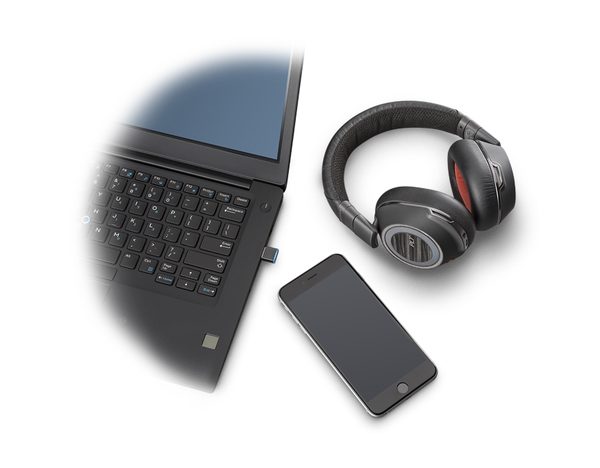
Paring the headset to more than one device is relatively straightforward. I never needed to enter the Bluetooth PIN (“0000”) and when I turn the unit on the connections happen very quickly. I have the headset paired with my laptop and also I use the BT600 on this computer too. I may have to force pairing with the BT600 by pressing the pin on the side. This is more convenient than removing the pair settings from the Bluetooth that is part of my laptop. For some reason, the BT600 handles going between call and music better than my Dell so I’m using the BT600 over the built-in Bluetooth. The range of the BT600/8200 pair is right around 100 feet.
Using the BT600 in combination with the Plantronics Hub software also permits monitoring the status of the headphones from an icon in the status tray on the right-hand side of the screen on a Windows machine. The icon will display the remaining battery percentage as an icon, indicate if charging is occurring, indicate the mute status, and display the remaining talk time if the mouse hovers over the icon. Below are a few screens from the Hub software screen to show the customization the headphones are capable of.
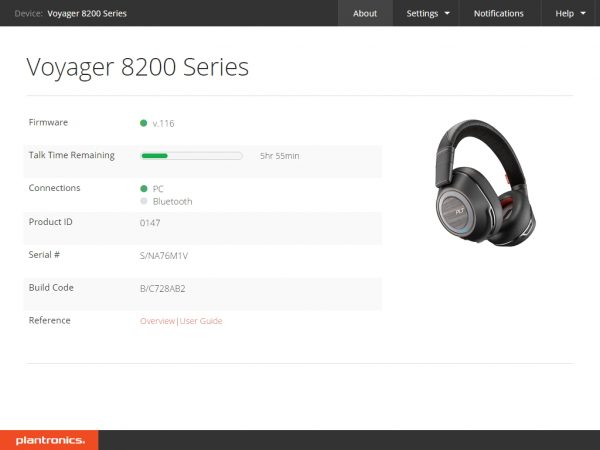
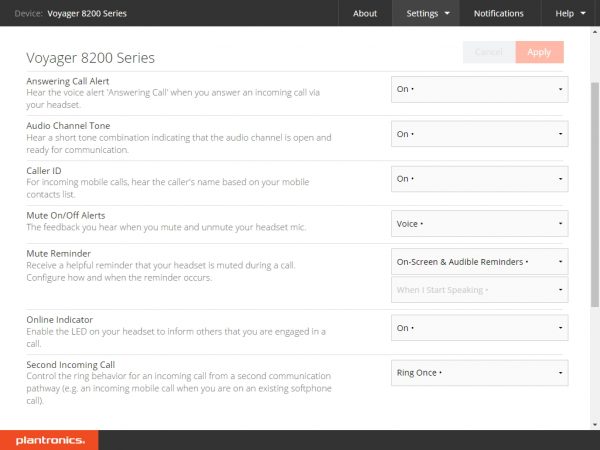
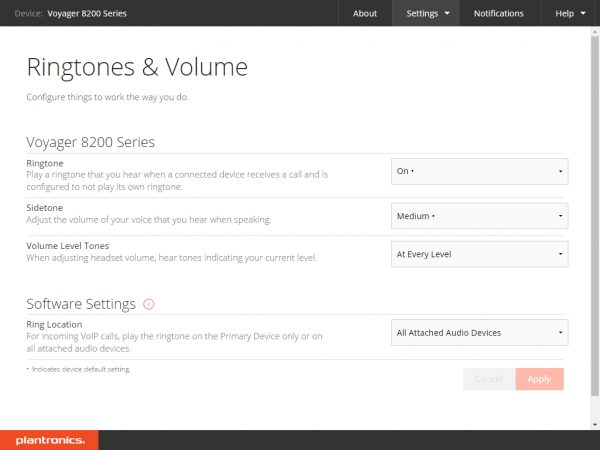
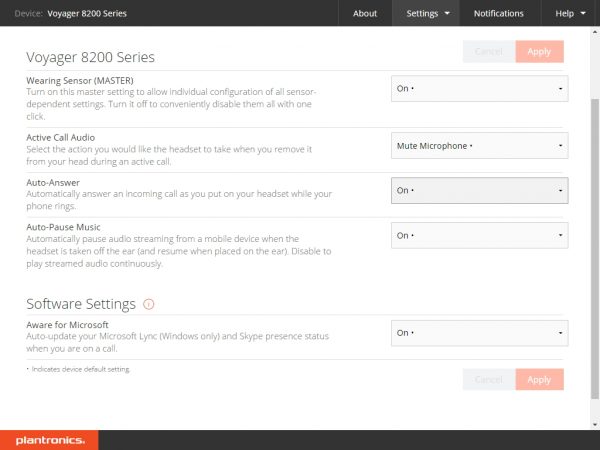
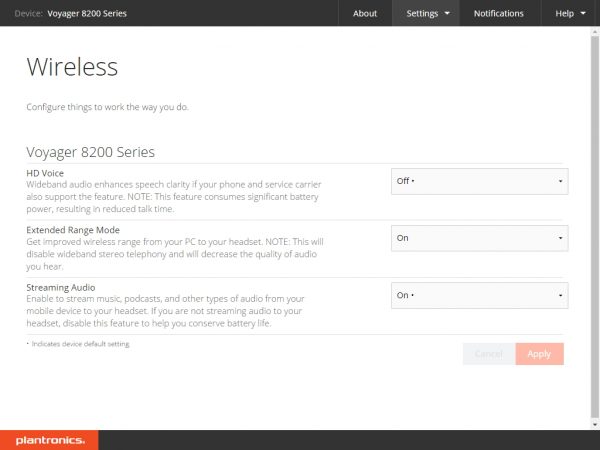
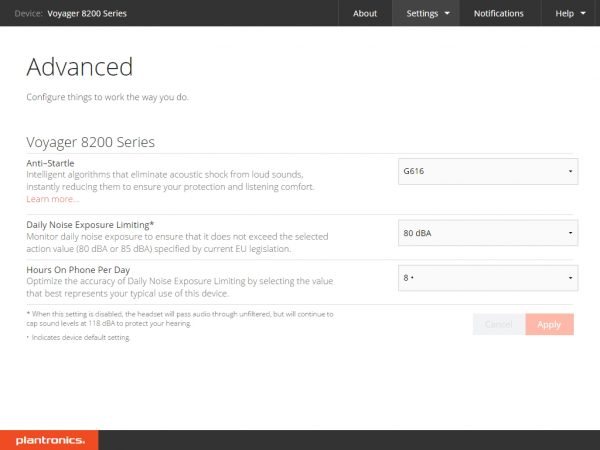
The iOS app also supports nearly all of the same settings and also includes an extensive help section for quick reference when setting up and using the headphones.
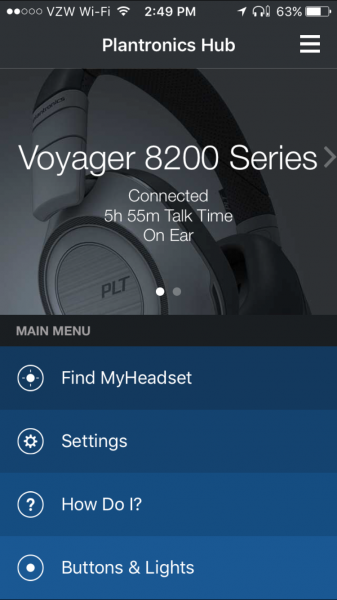
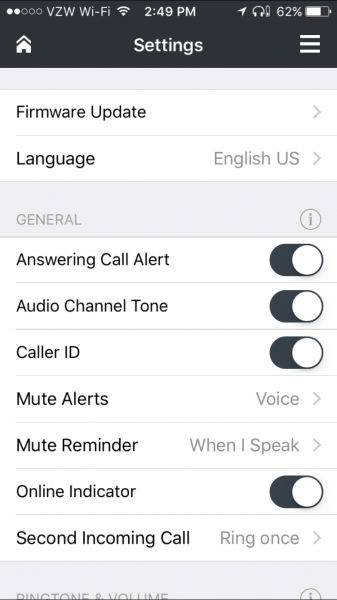
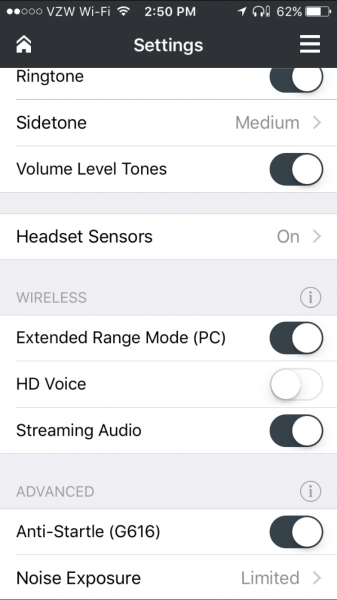
One of the unique features on these headphones is that they will limit the volume to protect hearing and they will also limit the exposure of the user to noise to below a specified decibel level for a certain number of hours per day. It is unclear how the headphones accomplish this but it is good to know that there are features to protect the listener’s hearing.
The sensor is another great feature that works as an auto-mute and auto-pause when the headphones are removed from the ears. This works well about 90 percent of the time, but I’m careful to manually mute the headphones in a conference call rather than risk the embarrassment of talking over the people on call if I need to communicate with some one off of the phone. In the other 10% of the time, the music may still play even though the headphones are loose around my neck.
One other set of features is that the headphones can be used as Bluetooth headphones while charging. Also, installing the 3.5 mm cable into the headphones turns off the Bluetooth radio but does not disable the ANC.
Performance
Since these are wireless headphones an evaluation of their claimed charging capacity is important. After using these until the battery was completely drained, twenty minutes of charging provides over 7 hours of “talk” time. While attempting to charge these completely, After 1:39 of charging the hub reported that there was 20:12 of talk time but I could tell from my USB tester that there was no longer any charge being sent to the headset. I unplugged and re-plugged the headset into the USB tester and the accrued charge on the headset, as reported by the hub, went down to 18:34 but the charge resumed and completed after two hours and 655mAh were charged into the headphones. After the two hours, the capacity as measured by the hub went to 21:47.



I used the same songs I listened to with the V-Moda on these headphones. My first test track is Fantasy by The xx. The pure base tones (in the high 40Hz range) come through strong and without distortion. and are aided by the bass tubes in these headphones. You don’t just hear the bass, you can feel it. I also listened to How Low by Ludacris which has some 32Hz tones that come through well amplified.
I wanted to hear how the subtly of an upright bass is delivered by the speakers so I listened to Bahia by John Coltrane. The V-Moda has a crispness and presence that is not communicated as well by the Plantronics headset. While the stereo separation is still present, the tones seemed a bit muted. This observation was made without any noise-cancellation, anti-startle, or noise exposure limitations active. Also, it doesn’t sound any better when plugged into the 3.5 mm port. The way the sound is reproduced doesn’t appear to be a Plantronics sensibility either because I also have a Plantronics .Audio 478 USB headset. It has stereo on-the-ear wideband 32mm drivers. I felt that the .Audio 478 headset had a better soundstage than the Voyager 8200. I noticed this lack of presence on each of the other songs from the V-moda review: There’s No Underwear in Space by The Claypool Lennon Delirium, La femme d’argent by Air, and French Suites by Bach played by Murry Perahia. However, the sound quality and performance does seem to come through fantastically while listening to movies.
I recorded the following track to test the various functions and to provide the reader with some understanding of what wearing the headphones is like:
Also, After reading Andy Chen’s review of the Plantronics 3200 I made the following test recording to demonstrate the voice isolating sound processing of the headset:
Positives
- Unified communication
- Noise Cancelling
- Two device Bluetooth Pairing
Negatives
- ANC not industry leading
- Crispness of musical playback
Final thoughts
These headphones have quite literally taken the place of three headphones on my desk: a headset for my phone, a headset for Webex, Skype and other computer-based conferencing, and headphones for listening to music. The fact that all of these things are now wireless is a huge benefit. It is quite liberating to be able to get up and walk over to someone else desk to discreetly get their opinion during a conference call, jump into a private office if I get a personal call, or make a work call from my desk phone without being tethered. My only complaint is that I wish the audio presence was crisper. That being said, there are a lot of noise-canceling headphones out there with excellent acoustics at the same price point (Sony, Bose, B&W). If the main reason for getting these does not include voice communication then one of the other models may provide better value. But if you are looking for one headphone that can do everything then the Plantronics 8200 UC may be just what you’re looking for.
Price: $379.95
Where to buy: Plantronics and Amazon
Source: The sample for this review was provided by Plantronics.
